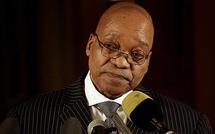
"Our constitution allows our people the right of freedom of assembly and expression and to protest where they feel they need to, but this must be done within the ambit of the law," Zuma said in Johannesburg.
"There can be no justification for violence, looting and destruction of property or attacks on foreign nationals residing in our country."
Zuma, who took office in May, pledged to address public grievances and acknowledged service delivery problems.
"This government will listen to people's concerns and will work with them to address them," he said.
The ANC leader took office after having campaigned to battle massive poverty faced by millions of South Africans 15 years after the end of apartheid, amid a 23.5 unemployment rate believed to be much higher.
Zuma has promised to create half a million jobs this year but on Thursday said job creation will be affected by the country's economy, which went into its first post-apartheid recession with more than 200,000 posts lost this year.
"Even if the economy begins to grow again next year, we will have to wait a little longer for a significant increase in new job creation," Zuma said.
Millions of South Africans feel they have yet to enjoy the fruits of democracy, as frustration mounts over dire housing conditions and a lack of basic services such as water and electricity.
When the mayor of the farming town of Balfour, southeast of Johannesburg, tried to speak to a crowd late Wednesday, his convoy was stoned and police used rubber bullets to break up the protest.
"The municipality has promised to build residences and a police station. They have promised houses since 1994. They built some, but for friends and family," said Bednock Mashinini, a 36-year-old who works for a produce company.
About 50 people marched Thursday through streets littered with debris from burnt tires, broken glass, and rocks in Balfour's Siyathemba township. Few stores opened after reports of looting, despite heavy police presence.
Meanwhile, in the port city of Durban, two grocery stores were looted Wednesday by about 100 people, mainly elderly women who said they were hungry.
"They just ate in the shops because they were hungry. Some took some rice and maize meal. They didn't struggle with the police. They are not criminals," provincial police spokesman Nozipho Mteshane told AFP.
Their protest was organised by a new group, the South African Unemployed People's Movement, which is demanding free education, better public health care, and a 1,500 rand (about 200 dollars) monthly grant for the unemployed.
Since the end of apartheid in 1994, South Africa has made strides in improving housing and access to clean water and electricity, by building 2.8 million houses.
But more than one million families still live in shacks without power, often sharing a single tap among dozens of households.
The latest demonstrations have also sparked anxious memories of the xenophobic attacks that swept the country one year ago, when 60 people died and tens of thousands of foreigners fled for refugee camps.
----------------------------------------------------------------------------------------------------------------------
"There can be no justification for violence, looting and destruction of property or attacks on foreign nationals residing in our country."
Zuma, who took office in May, pledged to address public grievances and acknowledged service delivery problems.
"This government will listen to people's concerns and will work with them to address them," he said.
The ANC leader took office after having campaigned to battle massive poverty faced by millions of South Africans 15 years after the end of apartheid, amid a 23.5 unemployment rate believed to be much higher.
Zuma has promised to create half a million jobs this year but on Thursday said job creation will be affected by the country's economy, which went into its first post-apartheid recession with more than 200,000 posts lost this year.
"Even if the economy begins to grow again next year, we will have to wait a little longer for a significant increase in new job creation," Zuma said.
Millions of South Africans feel they have yet to enjoy the fruits of democracy, as frustration mounts over dire housing conditions and a lack of basic services such as water and electricity.
When the mayor of the farming town of Balfour, southeast of Johannesburg, tried to speak to a crowd late Wednesday, his convoy was stoned and police used rubber bullets to break up the protest.
"The municipality has promised to build residences and a police station. They have promised houses since 1994. They built some, but for friends and family," said Bednock Mashinini, a 36-year-old who works for a produce company.
About 50 people marched Thursday through streets littered with debris from burnt tires, broken glass, and rocks in Balfour's Siyathemba township. Few stores opened after reports of looting, despite heavy police presence.
Meanwhile, in the port city of Durban, two grocery stores were looted Wednesday by about 100 people, mainly elderly women who said they were hungry.
"They just ate in the shops because they were hungry. Some took some rice and maize meal. They didn't struggle with the police. They are not criminals," provincial police spokesman Nozipho Mteshane told AFP.
Their protest was organised by a new group, the South African Unemployed People's Movement, which is demanding free education, better public health care, and a 1,500 rand (about 200 dollars) monthly grant for the unemployed.
Since the end of apartheid in 1994, South Africa has made strides in improving housing and access to clean water and electricity, by building 2.8 million houses.
But more than one million families still live in shacks without power, often sharing a single tap among dozens of households.
The latest demonstrations have also sparked anxious memories of the xenophobic attacks that swept the country one year ago, when 60 people died and tens of thousands of foreigners fled for refugee camps.
----------------------------------------------------------------------------------------------------------------------









 Home
Home Politics
Politics









